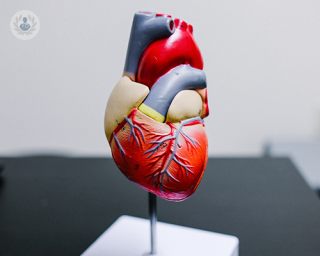What is aortic stenosis?
Aortic stenosis is a heart defect characterised by the narrowing of the aortic valve opening. In turn, this narrowing restricts the flow of blood from the left ventricle to the aorta. It can result either from a congenital birth defect or in ageing patients where scarring and calcium deposits build up in the valve opening. Treatment may require surgical valve repair or replacement.

What are the symptoms of aortic stenosis?
Sometimes aortic stenosis is asymptomatic but it depends on how severe the condition is in the individual. Some people may not experience any symptoms for many years but when they do, these may include:
- Breathlessness
- Chest pain (angina)
- Feeling dizzy or faint
- Heart palpitations
- Heart murmur - which is heard through a stethoscope
- Fatigue that is felt when exercising
What causes aortic stenosis?
The heart consists of four valves (mitral, tricuspid, pulmonary and aortic valves) that keep the blood flowing in the right direction. Each valve opens during a heartbeat but sometimes they do not open or close properly, which disrupts the blood flow to your heart.
The aortic valve between the lower left chamber and the main artery (aorta) becomes narrowed (stenosis) in the condition aortic stenosis. The left ventricle then has to work harder to make sure the blood pumps around the body, however, this causes it to thicken and enlarge. The extra work can lead to heart failure.
What are the risk factors for aortic stenosis?
Risk factors for the condition may include:
- Old age
- Congenital heart conditions
- Diabetes, hypertension or high cholesterol
- Chronic kidney disease
How is it diagnosed?
Aortic stenosis can be diagnosed using:
- Echocardiogram
- Electrocardiogram
- Chest X-ray
- Exercise tests
- CT scan
- Cardiac MRI
- Cardiac catheterization
How is aortic valve stenosis treated?
The treatment plan will be based on the individual case, depending on the severity of the condition and will be decided by the cardiologist.
If your symptoms are mild, the doctor will monitor your heart with regular check-ups and will suggest healthy lifestyle changes for you to make.
Surgery may be required in some cases in order to fix or replace the aortic valve.
Surgical procedure options include aortic valve repair, balloon valvuloplasty, aortic replacement (TAVR).
Aortic stenosis
Dr Konrad Grosser - Cardiology
Created on: 06-26-2019
Updated on: 07-17-2023
Edited by: Conor Dunworth
What is aortic stenosis?
Aortic stenosis is a heart defect characterised by the narrowing of the aortic valve opening. In turn, this narrowing restricts the flow of blood from the left ventricle to the aorta. It can result either from a congenital birth defect or in ageing patients where scarring and calcium deposits build up in the valve opening. Treatment may require surgical valve repair or replacement.

What are the symptoms of aortic stenosis?
Sometimes aortic stenosis is asymptomatic but it depends on how severe the condition is in the individual. Some people may not experience any symptoms for many years but when they do, these may include:
- Breathlessness
- Chest pain (angina)
- Feeling dizzy or faint
- Heart palpitations
- Heart murmur - which is heard through a stethoscope
- Fatigue that is felt when exercising
What causes aortic stenosis?
The heart consists of four valves (mitral, tricuspid, pulmonary and aortic valves) that keep the blood flowing in the right direction. Each valve opens during a heartbeat but sometimes they do not open or close properly, which disrupts the blood flow to your heart.
The aortic valve between the lower left chamber and the main artery (aorta) becomes narrowed (stenosis) in the condition aortic stenosis. The left ventricle then has to work harder to make sure the blood pumps around the body, however, this causes it to thicken and enlarge. The extra work can lead to heart failure.
What are the risk factors for aortic stenosis?
Risk factors for the condition may include:
- Old age
- Congenital heart conditions
- Diabetes, hypertension or high cholesterol
- Chronic kidney disease
How is it diagnosed?
Aortic stenosis can be diagnosed using:
- Echocardiogram
- Electrocardiogram
- Chest X-ray
- Exercise tests
- CT scan
- Cardiac MRI
- Cardiac catheterization
How is aortic valve stenosis treated?
The treatment plan will be based on the individual case, depending on the severity of the condition and will be decided by the cardiologist.
If your symptoms are mild, the doctor will monitor your heart with regular check-ups and will suggest healthy lifestyle changes for you to make.
Surgery may be required in some cases in order to fix or replace the aortic valve.
Surgical procedure options include aortic valve repair, balloon valvuloplasty, aortic replacement (TAVR).


Blackouts (syncope) explained: possible causes, diagnostic tests and when to see a doctor
By Dr Syed Afzal Sohaib
2025-01-20
About half the UK population experience syncope (a blackout) at least once in their lifetime. Usually, the cause is unrelated to the heart. However, if blackouts are caused by the heart, they usually require urgent medical attention. Mr Azfal Sohaib explains the potential causes, when to see a doctor, and the tests you might undergo. See more


How successful is keyhole aortic valve surgery?
By Mr Christopher Young
2025-01-20
Keyhole aortic valve surgery, also known as minimally invasive aortic valve replacement (mini-AVR), is a modern surgical technique used to treat conditions like aortic valve stenosis or aortic regurgitation. This article takes a look at how this procedure's success is highly favourable, offering numerous benefits for patients. See more


All about TAVI
By Professor Sagar Doshi
2025-01-19
Transcatheter aortic valve implantation (TAVI), also known as transcatheter aortic valve replacement (TAVR), is a minimally invasive procedure designed to replace a narrowed aortic valve that is not functioning properly due to a condition called aortic stenosis. See more


Aortic stenosis: what is it and how does it occur?
By Dr Iqbal Malik
2025-01-16
In our latest article, we spoke to exceptionally well-regarded cardiologist, Dr Iqbal Malik, with regards to the common valve disease condition aortic stenosis. Here, the London-based doctor offers his expert insight into the heart condition, describing why it occurs and outlining effective minimally invasive treatment options for the heart-related disease. See more
Experts in Aortic stenosis
-
Professor Olaf Wendler
Cardiothoracic surgeryExpert in:
- Aortic valve replacement
- Aortic aneurysms
- Aortic stenosis
- Mitral valve repair
- Mitral valve repair (minimally invasive)
- Atrial Fibrillation
-
Mr George Asimakopoulos
Cardiothoracic surgeryExpert in:
- Coronary bypass surgery
- Coronary heart disease
- Heart valve surgery
- Aortic valve replacement (minimally invasive)
- Aortic valve replacement
- Aortic stenosis
-
Professor Wael Awad
Cardiothoracic surgeryExpert in:
- Aortic stenosis
- Aortic valve replacement (minimally invasive)
- Coronary bypass surgery
- Heart valve surgery
- Mitral valve repair
- Aortic root surgery
-
Dr Sam Dawkins
CardiologyExpert in:
- Aortic stenosis
- Heart attack
- Mitral valve repair
- Heart failure
- Hypertension (high blood pressure)
- Coronary heart disease
-
Mr Ranjit Deshpande
CardiologyExpert in:
- Aortic stenosis
- Atrial Fibrillation
- Mitral valve repair
- Arrhythmia
- Coronary heart disease
- Coronary bypass surgery
- See all

The Harley Street Clinic - part of HCA Healthcare
The Harley Street Clinic - part of HCA Healthcare
35 Weymouth Street, London. W1G 8BJ
No existe teléfono en el centro.
By using the telephone number provided by TOP DOCTORS, you automatically agree to let us use your phone number for statistical and commercial purposes. For further information, read our Privacy Policy
Top Doctors

Cleveland Clinic London Hospital
Cleveland Clinic London Hospital
33 Grosvenor Place, SW1X 7HY
No existe teléfono en el centro.
By using the telephone number provided by TOP DOCTORS, you automatically agree to let us use your phone number for statistical and commercial purposes. For further information, read our Privacy Policy
Top Doctors

The Wellington Hospital - part of HCA Healthcare
The Wellington Hospital - part of HCA Healthcare
Wellington Hospital South Bldg, 8A Wellington Pl, NW8 9LE
No existe teléfono en el centro.
By using the telephone number provided by TOP DOCTORS, you automatically agree to let us use your phone number for statistical and commercial purposes. For further information, read our Privacy Policy
Top Doctors
-
The Harley Street Clinic - part of HCA Healthcare
35 Weymouth Street, London. W1G 8BJ, Central LondonExpert in:
- Cancer
- Head and neck cancer
- Cardiology
- Intensive care
- Diagnostic Imaging
- Women’s health
-
Cleveland Clinic London Hospital
33 Grosvenor Place, SW1X 7HY, Central LondonExpert in:
- Cardiology
- Colorectal surgery
- Minimal access surgery (keyhole surgery)
- Gallbladder surgery
- Diagnostic Imaging
- Ultrasound
-
The Wellington Hospital - part of HCA Healthcare
Wellington Hospital South Bldg, 8A Wellington Pl, NW8 9LE, Central LondonExpert in:
- Digestive
- Cardiology
- Orthopaedic surgery
- Orthopaedic spinal surgery
- Intensive care
- Spine
- See all
- Most viewed diseases, medical tests, and treatments
- Narcolepsy
- Snoring
- Polysomnography (sleep study)
- Alzheimer's disease
- Chronic headache
- Electrophysiology study
- Autoimmune diseases
- Joint pain
- Nutrition
- Genetic testing








